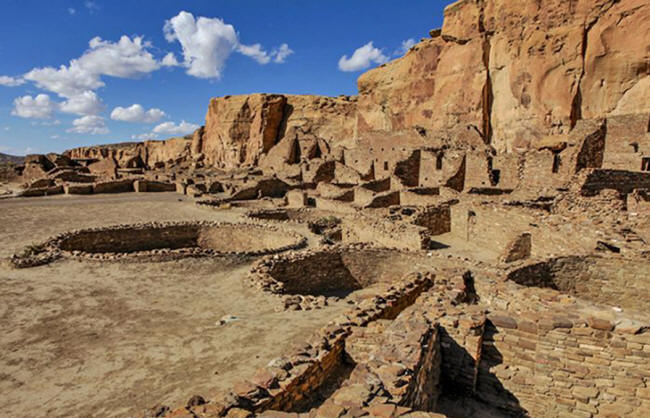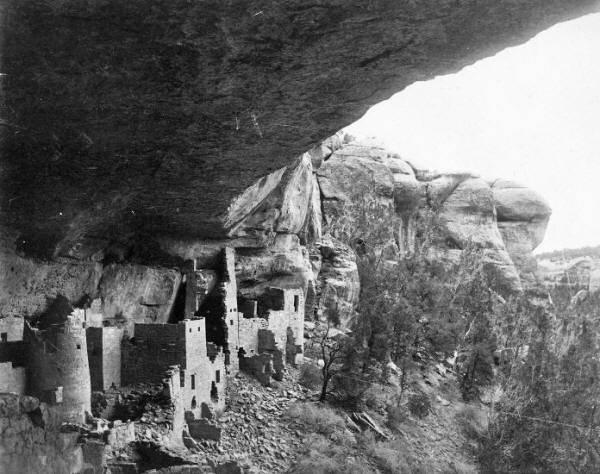|

by Jan Bartek
April
27, 2021
from
AncientPages Website

Chaco Canyon:
Chaco Culture National Historical Park,
New Mexico.
Credit: Dot Nielsen / Flickr.
Archeologists have long
speculated about the causes of occasional upheavals in the
pre-Spanish societies created by the ancestors of contemporary
Pueblo peoples.
These Ancestral Pueblo communities once occupied the
Four Corners area of the U.S. from
500 to 1300 where today Colorado borders Utah, Arizona, and New
Mexico.
While these communities were often stable for many decades, they
experienced several disruptive social transformations before leaving
the area in the late 1200s.
When more precise
measurements indicated that droughts coincided with these
transformations, many archeologists decided that these climate
challenges were their primary cause.
However, a new study reveals the ancient Pueblo societies struggle
with social tensions, which contributed to their downfall.
Drought is often blamed for the periodic disruptions of these Pueblo
societies, but climate problems alone were not enough to end periods
of ancient Pueblo development in the southwestern United States.
Archaeologists have found evidence that,
slowly accumulating social
tension likely played a substantial role in three dramatic upheavals
in Pueblo development.
The findings, detailed in an article in the
Proceedings of the
National Academy of Sciences (Loss
of Resilience preceded Transformations of pre-Hispanic Pueblo
Societies), showed that Pueblo farmers often
persevered through droughts, but when social tensions were
increasing, even modest droughts could spell the end of an era of
development.
"Societies that are
cohesive can often find ways to overcome climate challenges,"
said Tim Kohler, a Washington State University archeologist and
corresponding author on the study.
"But societies that are riven by internal social dynamics of any
sort - which could be wealth differences, racial disparities or
other divisions - are fragile because of those factors.
Then climate
challenges can easily become very serious."
In this study, Tim
Kohler collaborated with complexity scientists from
Wageningen University in The Netherlands, led by Marten
Scheffer, who have shown that loss of resilience in a system
approaching a tipping point can be detected through subtle changes
in fluctuation patterns.
"Those warning
signals turn out to be strikingly universal," said Scheffer,
first author on the study.
"They are based on
the fact that slowing down of recovery from small perturbations
signals loss of resilience."
Other research has found
signs of such "critical slowing down" in systems as diverse as the
human brain, tropical rainforests and ice caps as they approach
critical transitions.
"When we saw the
amazingly detailed data assembled by Kohler's team, we thought
this would be the ideal case to see if our indicators might
detect when societies become unstable - something quite relevant
in the current social context," Scheffer said.
The research used
tree-ring analyses of wood beams used for construction, which
provided a time series of estimated tree-cutting activity spanning
many centuries.
"This record is like
a social thermometer," said Kohler, who is also affiliated with
the Crow Canyon Archaeological Center in Colorado and the Santa
Fe Institute in New Mexico.
"Tree cutting and
construction are vital components of these societies. Any
deviation from normal tells you something is going on."
They found that weakened
recovery from interruptions in construction activity preceded three
major transformations of Pueblo societies.
These slow-downs were
different than other interruptions, which showed quick returns
to normal in the following years...
The archeologists also
noted increased signs of violence at the same time, confirming that
tension had likely increased and that societies were nearing a
tipping point.

Drought is often blamed for the periodic disruptions
of
ancient Pueblo societies of the U.S. Southwest,
but in
a study with potential implications for the modern world,
archaeologists found evidence that slowly accumulating
social
tension likely played a substantial role in three dramatic upheavals
in
Pueblo development.
The
findings show that Pueblo farmers often persevered
through
droughts, but when social tensions were increasing,
even
modest droughts could spell the end
of an
era of development.
Credit:
Mesa Verde National Park,
MEVE
11084
This happened at the end of the period known as the
Basketmaker
III, around the year 700, as well as near the ends of the
periods called Pueblo I and Pueblo II, around 900 and
1140 respectively.
Near the end of each
period, there was also evidence of drought.
The findings indicate
that it was the two factors together - social fragility and
drought - that spelled trouble for these societies.
Social fragility was not
at play, however, at the end of the Pueblo III period in the
late 1200s when Pueblo farmers left the Four Corners with most
moving far south.
This study supports the
theory that it was a combination of drought and
conflict with outside groups that spurred the Pueblo
peoples to leave.
Kohler said we can still learn from what happens when climate
challenges and social problems coincide.
"Today we face
multiple social problems including
rising wealth inequality along
with deep political and racial divisions, just as climate change
is no longer theoretical," Kohler said.
"If we're not ready
to face the challenges of changing climate as a cohesive
society, there will be real trouble."
| 


